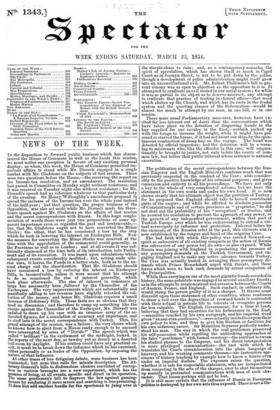NEWS OF THE WEEK.
Is the disposition to forward public business which has charac- terized the House of Commons as well as the Lords this session, we must notice one exception in favour of any exciting personal display; as when, this week, the House of Commons permitted im- portant affairs to stand while Mr. Disraeli engaged in a single combat with Mr. Gladstone on the subjects of last session. There were two questions before the House,—the receiving the report on the Income-tax resolution, and an amendment. The resolution had passed in Committee on Monday night without resistance, and it was received on Tuesday night also without resistance ; for Mr. Disraeli's speech had no reference whatever to that particular duty of the evening. Sir Henry Willoughby's amendment proposed to spread the increase of the Income-tax over the whole year instead of the half-year ; but that question, the proper business of the Opposition, was also set aside while Mr. Disraeli made his three- hours speech against Mr. Gladstone on the affairs of last session and the secret correspondence with Russia. In this huge conglo- meration of words there were just two propositions of some ap- parent importance even as regarded the past and irretrievable,— one, that Mr. Gladstone ought not to have converted the Minor Stocks ; the other, that he has occasioned a loss by the step which he took in lowering the interest on Exchequer Bills. Now the measure for converting the Minor Stocks was received at the time with the approbation of the commercial world generally, in the Provinces as well as in London ; and at all events it was suf- ficiently discussed at the time both of its introduction into Parlia- ment and of its execution. It was based upon calculations which subsequent events considerably modified ; but, setting aside ulte- rior uses, it leaves the Funds in a better state, both as to the an- nual charge and the classification. That Mr. Gladstone should have occasioned a loss by reducing the interest on Exchequer Bills, is inconceivable, unless it were meant that his attempt to do so occasioned the rise of interest generally, which took place afterwards. The rise of -interest in commerce at large has necessarily been followed by the Chancellor of the Exchequer. The very improvements which are substantially and manifestly adding to our revenue have slightly retarded the col- lection of the money, and hence Mr. Gladstone requires a small increase of Deficiency Bills. These facts are so obvious that they need no discussion ; and therefore to vamp up something like the charge against the Chancellor of the Exchequer, Mr. Disraeli was Induced to dress up his ease with an immense array of the re- iterated figures, for a simulation of accuracy and importance, and to stuff into it the secret correspondence with Turkey. This, his grand attempt of the session, was a failure ; the very cheers which he knows how to elicit from a House ready enough to be amused were interrupted by cries of "Divide!" The speech which was called" brilliant" in the excitement of the midnight, looked, in the reports of the next day, as tawdry yet as dreary as a deserted ball-room by daylight. If his oration could have any practical re- snit, it must be to break down the influence which he has exercised, either personally or as leader of the Opposition, by exposing the nature of that influence.
At other times of less fatiguing debate, some business has been transacted ; but none that calls for minute description. The At- to, mey-Generars bills to disfranchise electors convicted of corrup- tion in various boroughs are a new experiment, whioh has the promise of being, at all events, specific and direct in its operation. The same gentleman's bill to improve the law against gaming- houses by rendering it more severe and searching is less promising. It does but add another hurdle for the sportsman to jump over in the steeple-chase to ruin; and, as a contemporary remarks, the spirit of speculation, which has shown itself as much in Cape! Court as in Jermyn Street, is not to be put down by the police, though a development of police administration might itself grow into an unconstitutional evil. Mr. Robert Phillimore's bill to pre- vent simony was as open to objection as the opposition to it is. It attempted to eradicate an evil rooted in our social system ; for while it was so partial in its object as to deserve mistrust, any attempt to eradicate that practice of trading in clerical offices—that weed which chokes up the Church, and which has its roots in the feudal system and the quieting clauses of the Reformation—would be almost too' much to attempt by one man, in one bill, or in one session.
These more usual Parliamentary measures, however, have ex- cited far less interest out of doors than the conversations which have taken place on the detection of disgusting frauds in the hay supplied for our cavalry in the East,—rubbish packed up with the forage to increase the weight, while it might have poi- soned or starved the horses, if it had not burnt our ships by the spon- taneous combustion of damp hay on the voyage. The fraud was detected by official inspectors ; and the detection will be a warn- ing to miscreants who, like the offender ia this case, will unques- tionably be brought to justice, not only before the courts of com- mon law, but before that public tribunal whose sentence is national execration.


































